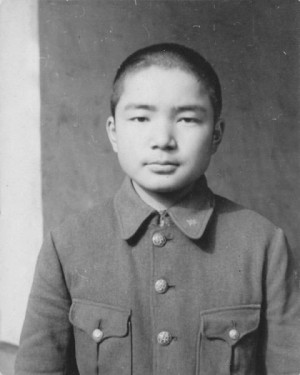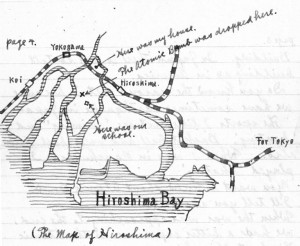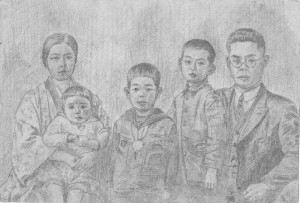03 Oct Letters from Hiroshima
This week I met Oliver “Lee” Evans, a gentleman who lives in my neighborhood. Lee served as an expert submarine hunter in the Navy from 1951 until 1954. He flew the Grumman AF Guardian, which he describes as one of the most dangerous airplanes ever built.
Lee’s Navy stories were interesting, but his gold mine is a fascinating collection of letters from Japan. When Lee was twelve years old, the nuns at his school in Pittsburgh made arrangements with the nuns in Japan for their students in each country to exchange letters. The year was 1948, and Japan was grappling with the aftereffects of the atomic bomb.
The Japanese students wrote to Lee in English with perfect penmanship. Below I have typed exact excerpts from letters written by Hiroo Kawakami in 1948. I am amazed at how well they grasped the English language.
When the war was approaching to the end, we had a bitter experience with the Atomic Bomb at Hiroshima. August 6, 1945 — on that day there was seen the scene of very awful disaster. Hiroshima was quite destroyed by Atomic Bomb. Our dear house was burnt down. Not only the city of Hiroshima but also the country region were broken down.
On the day we, the second year middle school boys of our school took a holiday for the factory where they were manufacturing partial machinery of aeroplanes. During the war, Japanese students were working in factories.
Then I went to a river for swimming. It was very fine. The warnings against an aerial attack were being unfastened. I heard a buzzing of B-29 on my way to the river. When I was walking on the path which leaded to the riverside, a blue flash like thunder-bolt sparkled behind me. Then I felt as if my head had swelled up twice than usual, the very moment I was thrown down by explosive pressure.
Clay, stone, roofing tiles fell over me. I had my cap blown off and the glass of the wrist watch broke. Presently I heard woman’s cry — “Help me, help me!” — here and there. When I stood up, it was dark an account of a cloud of sand. But it soon clearing up, I dashed to my house.
Ah, Hiroshima was completely destroyed! The peaceful town was turned into hell for a moment. Every road was covered by earth, roofing tiles, and telegraphic wife. All houses were fallen down without exception. Wounded or burned people (by radiant ray of atomic bomb) trudged along the street. Meanwhile, there was in a blaze here and there, and sometimes the exploding roar of storehouses was heard.

Hiroo Kawakami in 1948. He was 16 years old. He wrote to Lee Evans that “I am also enclosing the photograph of myself. You will be surprised to look at it. We, the Japanese boys are all ‘shaven heads.’ I hear that in America only the prisoners are ‘shaven heads.’ Lee would very much like to reunite with his Japanese friends.
When I came home, I found that the houses did not barely fell down. But the fence was broken; the both sides of wall at the passage leaned against it, and it hardly allowed us to pass through it. The clock fell and was broken, the roof was blown off, and each room was covered with dust. Fortunately my mother was all right. She was not wounded at all.
Presently our dear house caught fire, too. We shouldered knapsacks which included food and medicine and left Hiroshima. On our way to countryside there were many wounded people who lay on the roadside. We put up at the farmer’s house for two days.
We were much surprised at the power of this bomb. When we returned to Hiroshima after two days’ absence, air was badly smelled on account of the odor of various things which were burnt and many corpses.
Our house was turned into a burnt field. The charred electric poles stood desolately, and fire was still lasting here and there. Under the bridges, on the road or the riverside there were found many dead men. We went to the riverside in order to find out the dead bodies of my grandfather and grandmother. We peeped at one by one the faces of the dead who lay on the ground. But we could not find the faces of them. We were terribly anxious.
Wonderfully, they lived at the corner of their garden. Indeed, that was miraculous. So we were all saved! Soon we removed to their rented house at the town called Ushita. An electric lamp was not lit and water did not flow from the water pipe for a while. If it rained, rainwater leaked from the roof to the floor. But we were living there.
Our life is now poor, compared with that of pre-war days. But I believe that in future, it will be better.
Ah! War is an awful thing. We love peace, isn’t it? Now a difference arise between U.S.A. and U.S.S.R. I pray that a war will not happen!
Around that same time, another of Lee’s penpals, Akira Sakumoto, shared his thoughts about the peace process.
We, Japanese must go without committing again such a way we had walked in the past and rebuild Japan as a peaceful country, so that it can serve the peace of the world. By doing so we could pay with some of our offenses, I’m sure.
The Japanese want the treaty is concluded as soon as possible, but most of them hope the army occupying stay at here for more several years, because they are afraid of the communistic power extending more and more.
The three Japanese boys that Lee corresponded with in 1948 were Hiroo Kawakami, Akira Sakumoto, and Hajime Takarada. We hope that someone will recognize one of them and make a comment with contact information. Lee would very much like to rekindle their friendships.




No Comments